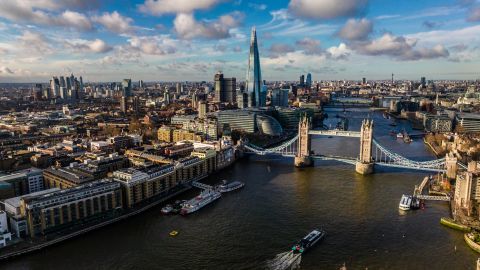The UK economy flatlined in the last quarter of 2022, meaning that it just managed to avoid falling into a recession. But the outlook for this year is much worse.
Gross domestic product (GDP) had fallen 0.2% in the July-September quarter, and two consecutive quarters of contraction would have pushed the country into a recession. GDP for the October-December period showed zero growth, the Office for National Statistics (ONS) said Friday.
For the whole of 2022, the economy grew by 4%, following an expansion of 7.6% in 2021. Its performance is likely to deteriorate sharply this year: the International Monetary Fund has forecast that the United Kingdom will be the only major economy to contract in 2023. And last week, the Bank of England forecast a 0.5% decline in UK economic output this year, broadly in line with the IMF’s prediction.
Looking through the details of Friday’s data, commentators saw the glass as half-empty.
“No recession on the pedantic definition of two consecutive quarters of falling GDP, but a calamitous performance nonetheless,” Samuel Tombs, chief UK economist at Pantheon Macroeconomics, tweeted. “The UK still is the ‘only’ G7 country in which GDP has not exceeded its pre-Covid peak yet.”
Similarly, David Bharier, head of research at the British Chambers of Commerce, pointed out the “worrying” fall in the production sector in the fourth quarter and the 0.5% fall in UK GDP in December.
“Small businesses have seen three years of economic shocks, including lockdowns, global supply chain crises, Brexit and soaring energy costs,” he said.
Strikes are hurting
Output in the United Kingdom’s dominant services sector stagnated in the fourth quarter, dragged down by a 0.8% fall in December, a month that saw widespread strikes.
There was “anecdotal evidence” that rail and postal strikes had hit some businesses, the ONS said. Public services were also negatively affected by walkouts in December, noted Darren Morgan, ONS director of economic statistics.
Industrial action is likely to dent economic output in the current quarter as well. On February 1, as many as half a million workers walked out across Britain in what unions said was the biggest single day of strikes in more than a decade. Thousands of ambulance workers and university staff are also on strike Friday.
Most workers taking part in the wave of strikes sweeping the country have demanded higher pay as soaring prices have decimated living standards. In its fight with inflation — which stood at 10.5% in December — the Bank of England has been hiking interest rates, constraining economic activity. UK consumers are particularly sensitive to rate rises as many have variable-rate mortgages that become more expensive as interest rates rise.
Source: CNN


